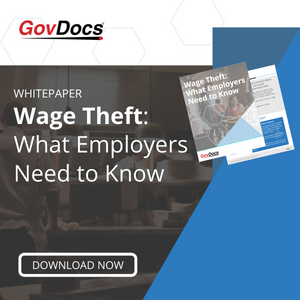EMPLOYMENT LAW NEWS
New Standard for Damages in Massachusetts Wage and Hour Compliance
By Jana Bjorklund, GovDocs Senior Counsel and Director, Employment Law and Compliance
Published April 26, 2022

Two decisions from Massachusetts Supreme Judicial Court set new standard for damages in wage and hour compliance.
In two recent cases, Massachusetts set new standards for employer liability when an employer does not provide timely payment of final wages for involuntarily discharged employees and when an employer fails to pay overtime wages under the Fair Labor Standards Act (FLSA) in Massachusetts.
Failure to Timely Pay Final Wages in Involuntary Discharge
The Massachusetts Supreme Judicial Court (SJC) on April 4, 2022, held that employees whose final wages have not been paid within the time frame required under the Massachusetts Wage Act are entitled to three times the wages owed, regardless of the length of the delay in payment.
This is the new standard in Massachusetts after the decision in Reuter v. City of Methuen, 489 Mass. 465, 2022 Mass. LEXIS 152 (Mass. April 4, 2022). This ruling eliminated the prior 20-year standard from the court that limited damages to treble interest on the delayed wage payment made before the employee filed suit.
Wage Payment Requirements Under the Massachusetts Wage Act
Generally, the Wage Act requires that employees be paid wages within six days following the end of the pay period during which the wages were earned.
However, when an employer involuntarily discharges an employee, that employee must be paid all earned wages on their date of discharge. “Wages” under the Massachusetts Wage Act includes accrued but unused vacation pay.
Reuter v. City of Methuen
 In Reuter, the plaintiff was fired for misconduct. At the time of her discharge, the plaintiff had accrued approximately $9,000 in unused vacation time. The employer did not pay the plaintiff’s accrued, unused vacation until three weeks after her termination date.
In Reuter, the plaintiff was fired for misconduct. At the time of her discharge, the plaintiff had accrued approximately $9,000 in unused vacation time. The employer did not pay the plaintiff’s accrued, unused vacation until three weeks after her termination date.
The employer then received a demand letter from her attorney demanding treble damages on the outstanding wages under the Massachusetts Wage Act, minus the amount already paid, plus attorney’s fees. The employer responded by sending payment of $185.42 in treble interest on the delayed payment plus attorneys’ fees consistent with the interpretation from prior case law.
The case ultimately reached the Massachusetts SJC, which held that the “over-all context and purpose” of the law “is directed at prompt payment of wages.” The court determined that any delay, regardless of the length, must be remedied with treble the amount of the late wages, not just treble the interest.
The court recognized the hardship its ruling may impose on employers when immediately discharging employees for serious misconduct. It did not deter them from their course, however. The court suggested that employers may want to consider suspending employees for a short period of time if final wages are not clear at the time of discharge. This would allow employers to calculate final wages before completing the employee’s termination of employment.
Failure to Pay Federal Overtime Wages in Massachusetts
On the heels of this decision, on April 14, 2022, the Massachusetts SJC held that employees may not recover treble damages for failure to pay federal overtime wages in Massachusetts.
In Devaney v. Zucchini Gold, LLC, et. Al., Mass. SJC-13176 (April 14, 2022), the court reversed the decision from the trial court awarding treble damages to plaintiffs, reasoning that the employer’s failure to pay overtime wages was a violation under the FLSA, not the Massachusetts Wage Act.
Imposing a penalty under a state law for violation of the FLSA conflicts with the federal remedies provided under the FLSA. Employees are therefore precluded from pursuing remedies under the Massachusetts Wage Act when the violation is under the federal overtime law.
The FLSA and the Massachusetts Wage Act
The FLSA contains a comprehensive enforcement process when employers fail to pay overtime wages and other wages, which includes criminal penalties for willful violations, liquidated damages, and attorneys’ fees.
However, an employer may avoid damages if it can show it acted in good faith and had reasonable grounds for believing it did not violate the FLSA.
Alternatively, the Massachusetts Wage Act has its own enforcement process, which is more generous than that under the FLSA. Employees who are successful in proving violations under the Massachusetts Wage Act are entitled to a mandatory award of treble damages and there is no corresponding escape provision for acting in good faith with reasonable grounds for believing it was not in violation of the law.
Devaney v. Zucchini Gold, LLC
In Devaney, the plaintiffs were employees of Rice Barn, a restaurant owned by Zucchini Gold. The employer had not kept record of hours worked or wages paid.
On the other hand, the employees were able to show they worked 50-73 hours per week but had not been paid overtime for hours worked in excess of 40 per week as required.
The plaintiffs claimed a violation of overtime wages under the FLSA and a violation under the Massachusetts Wage Act for timely payment of wages. The lawsuit did not include a claim that there was a violation of the Massachusetts Wage Act for overtime wages because the state law contains an exemption from overtime for restaurant workers that is not included in the FLSA.
The trial court held for the plaintiffs on summary judgment for failure to pay overtime wages under both FLSA and the Massachusetts Wage Act. A jury awarded treble damages and Zucchini Gold appealed.
On appeal, the SJC determined that the award of treble damages under the Massachusetts Wage Act for failure to pay overtime wages was erroneous. Zucchini Gold’s obligation to pay overtime existed only under the FLSA and therefore, penalties for the violation should be subject to the FLSA damages, not the damages available under state law.
Key Takeaways
Employers should ensure they follow timelines for payment of wages outlined in the Massachusetts Wage Act.
Involuntary terminations require payment of final wages on the date of termination. Any failure to pay an involuntarily discharged employee their final wages, including vacation pay earned but unused at time of termination, will now result in an employer being liable for treble the full amount of late wages.
Make sure you have the calculations for final pay completed before triggering any involuntary discharges. If that is not possible, consider the court’s suggestion of suspension prior to discharge if additional time is needed to calculate final wages for involuntarily discharged employees.
Voluntary terminations require payment of final wages the following regular pay day. Employers should be prepared to meet these deadlines in either situation to avoid this new standard for damages on late payment of wages in Massachusetts.
On overtime wages, make sure to keep accurate records and documentation of hours worked and pay employees accordingly. Failure to maintain records violates federal and state law and leaves an employer without any recourse to object to documentation maintained by an employee regarding hours worked, regardless of their accuracy.
This Employment Law News blog is intended for market awareness only, it is not to be used for legal advice or counsel.
Keep Informed
with GovDocs Employment Law News
What is GovDocs?
GovDocs simplifies employment law compliance for large, multi-jurisdiction employers in the U.S. and Canada. The GovDocs software platform integrates three solutions in one convenient place to help you master the employment laws impacting your business. Whether you manage a postings, minimum wage or paid leave program, our products cut through research time, provide proactive insights into the everchanging landscape of employment laws and reduce the risk of noncompliance. The company is headquartered in Eagan, Minn.
The GovDocs Poster Store simplifies posting compliance for employers with less than 30 locations across all industries, offering a variety of posting products to meet your labor law compliance needs.



